THE SPICY COPY BLOG
MUD\WTR Case Study: Why Their Web Copy is Freaking Brilliant
MUD\WTR Case Study: Why Their Web Copy is Freaking Brilliant
As a website copywriter, my job is to be obsessed with good website copy.
(Nerdy confession: I have a whole page in Notion with links to websites with good website copy, organized by industry…)
And every now and then, I’ll come across a website with copy so good, I just can’t stop thinking about it.
That’s exactly how I felt when I found MUD\WTR.
If you aren’t familiar with MUD\WTR, it’s a drink created as an alternative to coffee. It’s also a brand that created the drink and has since expanded into offering other powders and teas designed for sipping that promise better sleep, focus, and energy in addition to their original, coffee alternative blend.
With thousands of reviews (we’re talking over 18,000+ just on their website) and millions of dollars generated in revenue each year, it’s safe to say MUD\WTR is doing pretty damn well. Which is great for them, but what we care about over here, is how damn good their website copy is. From their first sentence to their entire brilliant About page, their website copy has me questioning if I’m ready to give up my love affair with coffee for something better.
And I bet, if you’re a coffee drinker, it will have you questioning too.
Coffee preferences aside, let’s dive into why exactly their website copy is so genius. Who knows, maybe it will spark some inspiration of your own.
First, a genius opening headline
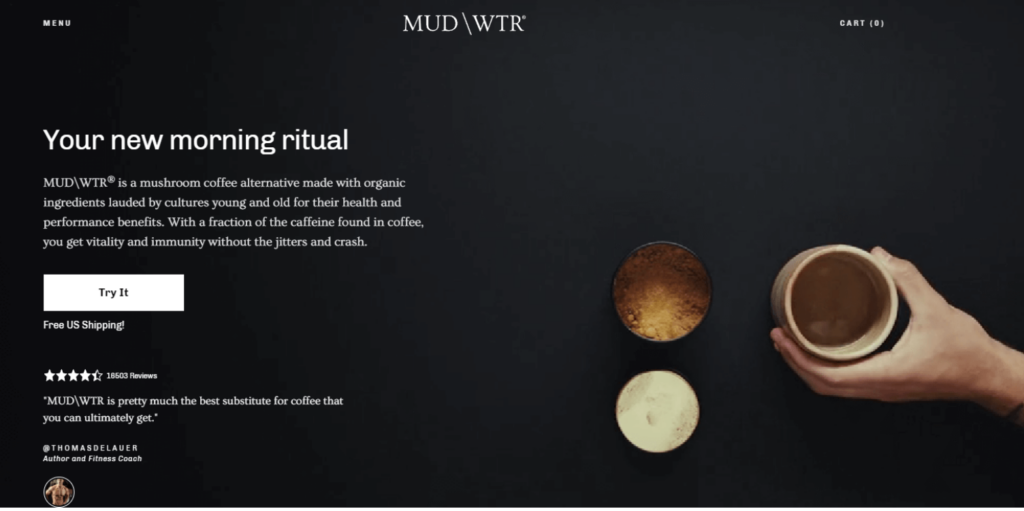
The goal of a headline is to capture someone’s attention, give them a general idea of the information that’s to come, and most importantly, get them to want to keep reading.
And “Your new morning ritual” does exactly that.
They don’t say: “Ready to ditch coffee?” Or, “Looking for a new morning ritual?” They tell us that we’ve just discovered our new morning ritual which immediately makes us wonder what our new morning ritual is, intriguing us enough to read the next sentence.
And that’s the goal of good copy—to keep us reading long enough to want to take action.
Second, they tell us what the product is and how it’s been around forever
“MUD\WTR® is a mushroom coffee alternative made with organic ingredients celebrated by cultures young and old for their health and performance benefits.”
From this second sentence, we know:
- It’s made from mushrooms
- It’s a coffee alternative
- It’s organic
- And has a history of its own
That last part is really important because MUD\WTR knows that coffee drinkers/retiring coffee drinkers (AKA their ideal customers) don’t just like coffee because it’s brown bean juice that gives them a little energy to start their day; it’s a beverage with a culture and history of its own.
Think about coffee shops and coffee bean snobs—it’s a lot more than a beverage and by including that MUD\WTR is made with “ingredients celebrated by cultures young and old,” their copy tells us that MUD\WTR isn’t just a brand new, trendy beverage, it’s been around for a while and has cultural significance… just like coffee.
And they liken their product to coffee because they know that when you’re trying to get someone to switch to a new product, you don’t want to make it so wildly different from the one they currently prefer that they’re too scared to try the alternative.
In other words, it’s a reassurance that MUD\WTR has similarities to coffee, but it’s even better.
And then they tell us why their product is better
“With a fraction of the caffeine found in coffee, you get focus, energy, and immunity without the jitters and crash.”
After directly touching on the similarities between coffee and MUD\WTR—they both involve a morning routine, have a history and a cultural background, and contain caffeine—their website copy goes one step further by throwing in “without the jitters and crash” which is something coffee drinkers don’t like (AKA a pain point)!
Essentially, within three sentences, their website copy has told us this product is just like coffee in all the good ways, but it doesn’t have the downsides, so it’s better.
Their CTA is an invitation rather than a hard sell
MUD\WTR knows that coffee drinkers are often set in their ways (coffee is one of those rituals people have for decades of their life) which is why their first CTA isn’t “Make the Switch” or “Ditch Coffee” or even “Say Goodbye to the Jitters,” but rather “Try It.”
It’s an invitation to branch out, rather than a serious commitment to ditch our beloved coffee forever. “Try it” is a beautiful phrase to use in this context because it makes us curious enough to purchase the product without feeling like we have to be all in right away.
They finish their above-the-fold-statement with 2 pieces of social proof
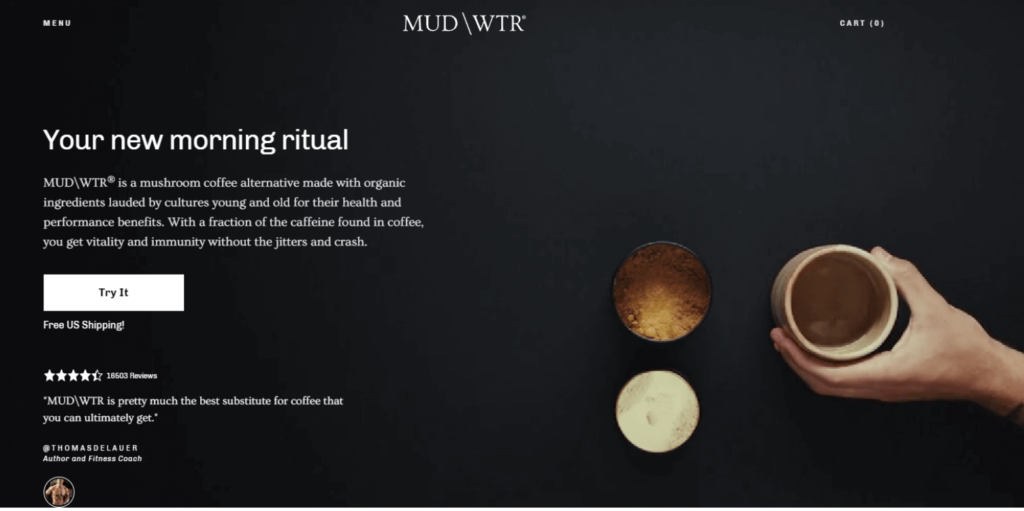
The first piece of social proof is their average rating of 4.5 stars across 18,503 reviews which tells us that 18,503 people have liked this product, implying we most likely will too.
And, to go a layer deeper, they hit us with a testimonial from a fitness coach that says “MUD\WTR is pretty much the best substitute for coffee that you can ultimately get.”
They could have chosen a testimonial that said: “My favorite drink ever,” or “This stuff tastes amazing,” or “I love drinking this every morning,” but they didn’t and that’s because MUD\WTR knows their ideal customer has one question in their mind that must be addressed in order for them to actually try MUD\WTR…
… And that question is: is this actually a good replacement for coffee?
By using THAT particular review, MUD\WTR doesn’t need to spell out “don’t worry, this is a great substitute for coffee” because they let someone else—someone with fitness and celebrity cred—do it for them, which is even more persuasive.
So yeah… GENIUS.
A perfect blend of casual and conversational
Another thing MUD\WTR does brilliantly in their web copy is use classic phrases, pop culture references, and semi-cliché statements in a playful and relatable way.
Like this…
(A CLASSIC!)

And this….
(We’ve all heard this one from our parents and it hurts way more than them being mad.)

And this…
(Anyone else getting serious Drake throwbacks? “Started from the bottom now we’re here… Started from the bottom now my whole team f*cking here…” 🎶)
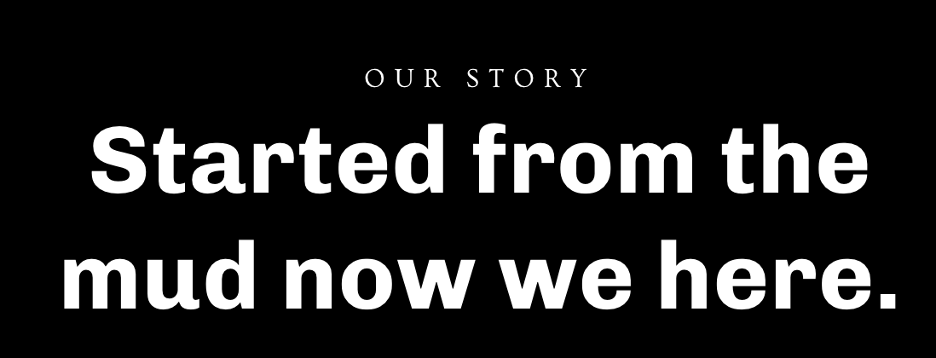
While this not only makes their website copy playful and engaging, it’s brilliant for another reason too…
The thing is, MUD\WTR‘s target audience (current coffee drinkers/retired coffee drinkers) is gonna have a lot of questions that must be answered and hesitation that must be overcome in order to buy into MUD\WTR. Why?
Because coffee isn’t just a beverage and coffee drinkers are often highly committed to coffee—even if they hate some of the side effects. So while some of them may be looking for an alternative to coffee, they also don’t want a beverage that is wildly unfamiliar (like a shot of green juice).
By using phrases we hear all the time, MUD\WTR‘s copy is subtly implying, “we’re one of you! We aren’t a scary, unfamiliar snake trying to steal you away from coffee. We’re people who liked coffee just like you and wanted to come up with a better product.”
The whole “I’m one of you” is a brilliant marketing tactic that Seth Godin (and other marketers!) covers extensively in his book, This is Marketing, where, among other things, he writes about how people like us do things like us. And that’s exactly what MUD\WTR is doing—by using references they know their ideal audience will understand, they’re implying they’re just like us.
They could have used medical language and hit us with the hard facts about why coffee is bad for our health. Or, they could have over-explained the health benefits of switching to MUD\WTR, but instead, their website copy comes across like a friend who’s using clichés and song references to joke around with us while also telling us about a cool product he invented that’s still a lot like coffee.
An about story that’s all about us (rather than the company)
And then we have the genius founder’s story.
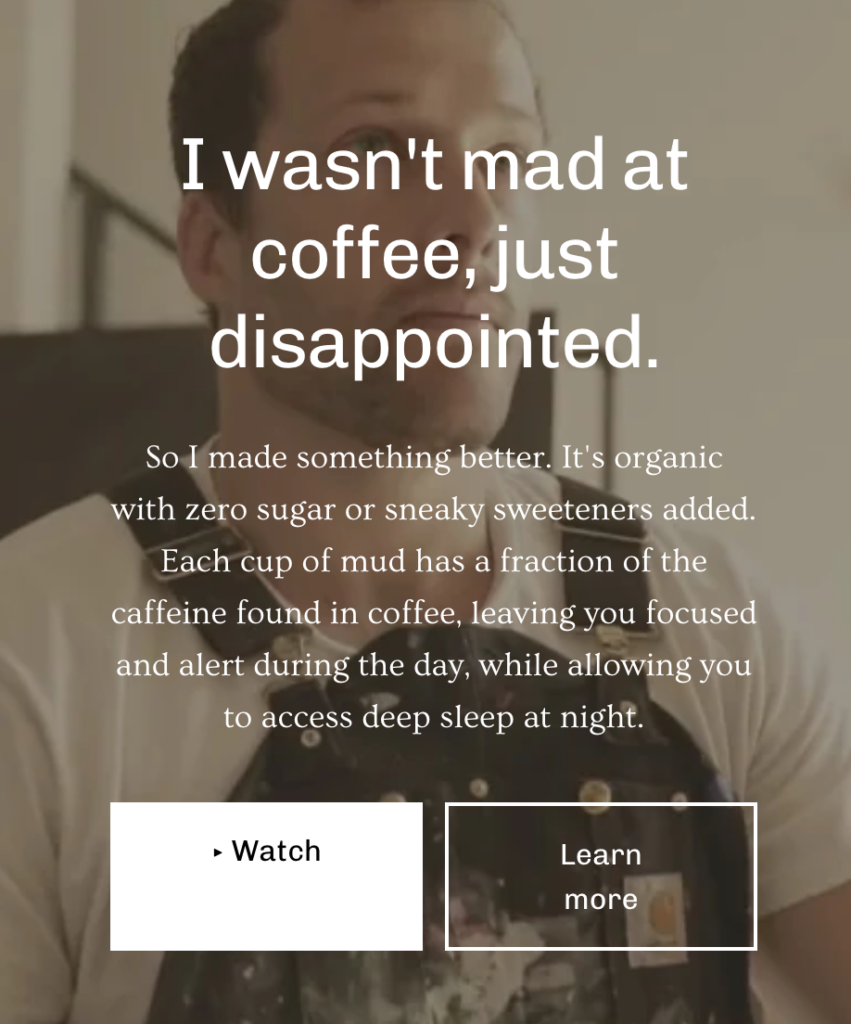
While this mini-about on their Homepage uses “I,” the copy is really talking about us—the coffee drinkers who aren’t completely satisfied with coffee. And chances are if you’re an avid coffee drinker (like I am!), you can absolutely relate to feeling disappointed with coffee. So while their website copy might be using “I,” it feels like it’s talking about our story and our experience too.
The paragraph underneath shares the benefits of their product and also implies that MUD\WTR is honest, suggesting other brands aren’t. By saying there’s “zero sugar or sneaky sweeteners added,” they’re subtly implying that that’s what other coffee alternative brands give you.
This section also has a “more of this and less of that” moment. “…focused and alert during the day, while allowing you to access deep sleep at night.” More focus and alertness; less messing with your sleep. A contrast of how it has everything good and none of the bad (which effectively and quietly disses coffee yet again).
Their website copy is also confident as hell and it shows in this section too, particularly in the line, “So I made something better.” Notice how it doesn’t say, “So I set out to make something better,” or “So I wanted to make something better.” It’s “So I made something better.” It’s done. Finished. A success. And that confidence makes us believe it’s true.
Their About page copy is brilliant because…
They address the elephant in the room: coffee drinkers like A LOT about coffee.

(Also, giving us the location and the coordinates? Hilarious. They’re being playful and setting the scene for a story like you do in a documentary which draws readers in.)
The website copy in this first section highlights alllll the good stuff there is about coffee:
- The smell
- The flavor
- The ritual
And then it shatters that dreamy scene of drinking coffee with all the crappy things that come along with it:
- The anxiety
- Jitters
- The comedown
- Messed up sleep cycle
- Needing another cup of coffee to fix it the next morning
MUD\WTR uses the beginning of their About page to not only show how relatable they are by saying “hey, we get it, there are lots of parts about coffee that we liked too!” but also to address the counterargument a potential customer could easily bring up: there are good parts to coffee, it’s not all bad.
Which makes coffee drinkers feel seen. This guy GETS it. He was a coffee drinker. He knows the good things about it which makes him qualified to talk about why coffee also sucks.
We start to question coffee even more

When you read that quote you probably laughed and then thought, yeah, that’s true, and that starts to make you wonder WHY it’s true, getting you to question your loyal devotion to coffee which is the first step it takes to eventually changing your coffee-drinking behavior.
The next few sentences following the quote, use “we” or “our” super duper intentionally.
“The drink we use every day to fuel our success didn’t seem worthy of its promise.” The website copy could have been, “The drink I used every day to fuel my success…” but instead, the copy continues to involve us in the founder’s story. And also, implies we deserve better.
And then the copy launches into what the founder was looking for which are the exact things a want-to-give-up coffee drinker is looking for, too. In other words, he is listing out all the benefits of his product in a far more graceful way than saying “these are the benefits.”

I love how this section ends on “Big ask, but there I went” because it’s a low-key brag—the website copy is implying that MUD\WTR accomplishes all of these things.
After that, the website copy recounts everything the founder tried, which is fun to read, and tells us: “I’ve tried everything, I know what I’m doing, and what I’ve created is the best of the best.”
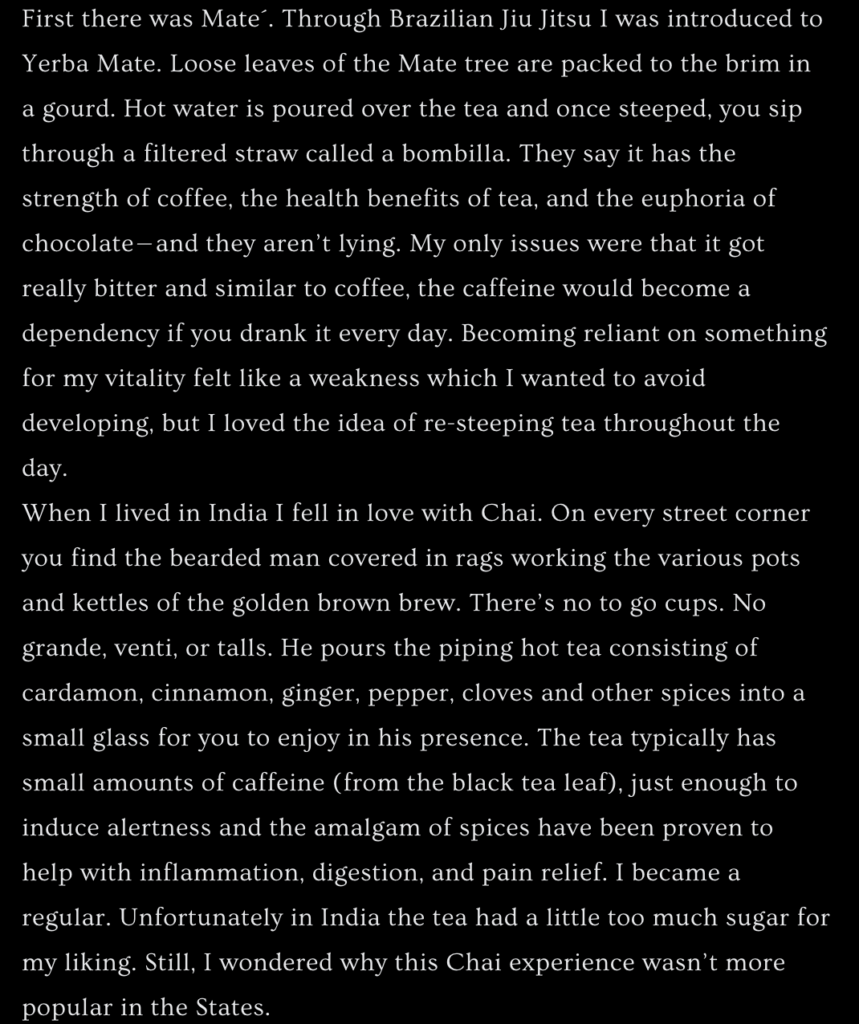
And if a potential customer was thinking maybe they should try chai or Maté or lion’s mane instead of MUD\WTR…
The website copy destroys that argument by explaining he’s already tried all of those things so they don’t need to.

The page ends on a personal note, making it feel like Shane’s right there, talking directly to YOU. It’s casual, it’s conversational, and it’s an invitation to drink WITH him—Shane, just a dude who made a cool drink on a quest for something better.
Bottom line: MUD\WTR does these things really well…
- MUD\WTR’s above-the-fold statement on their Homepage is genius because it intrigues us with an opening line about our new morning ritual, tells us what the product is while also explaining how it’s not only a coffee alternative, but a better option by saying what it doesn’t have (the jitters and crash) – it’s like coffee but without the bad stuff
- They use social proof to address potential hesitations and questions like: is this product actually a good substitute for coffee?
- They use references we hear all the time to keep everything casual, conversational, and familiar
- The founder’s story highlights the good parts about coffee implying he gets why people drink it because he did too
- The About page shares the care and expertise that went into creating MUD\WTR proving it’s a trustworthy product and the best option out there
- The About page ends signed off by “Shane,” making it feel like a friend has invited us into his world. This gives the whole About page a conversational and intimate feel that rarely happens with big businesses
Bottom bottom line:
MUD\WTR’s web copy is freaking brilliant. And now, I’m gonna have to try it.
*Covers the eyes of my coffee mug sitting on my desk right next to me*